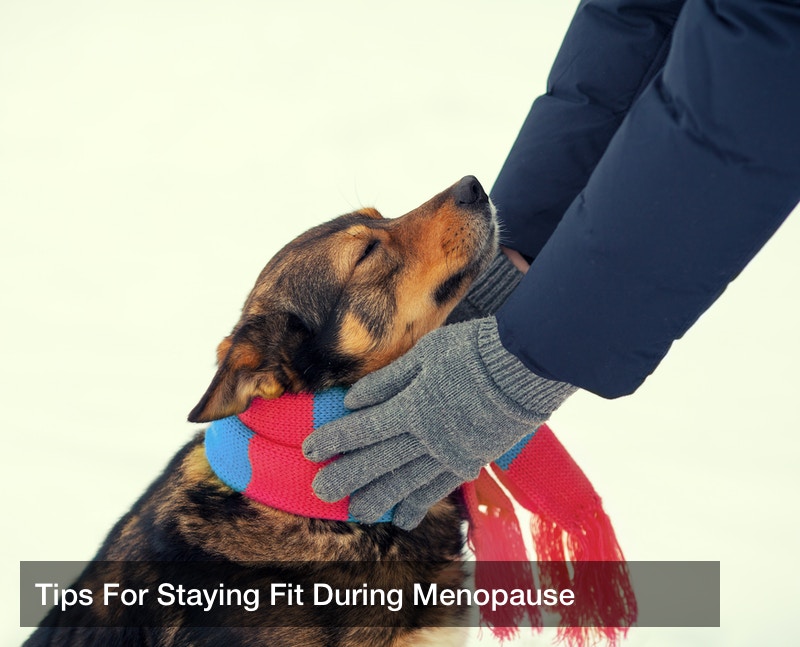
If you are around 51 years old, you’re probably already battling with the symptoms of menopause. You may be having trouble sleeping, and it feels like your hormones are all over the place. It seems like no matter what you do, you just can’t seem to get off that excess body fat around your middle. There are some menopause solutions to help you look and feel better. Here are tips for staying healthy and getting fit with exercise during menopause.

Preventative Care
Women who are experiencing menopause have unique needs when it comes to their health care. They can be at greater risk for developing osteoporosis, heart disease, and other chronic conditions. Preventative care is essential for getting and staying healthy. It’s important for women to stay strong and healthy to avoid body and foot injury treatment as their bones become brittle with age. Preventative care can help relieve menopause symptoms such as erratic mood swings and hot flashes that make you want to crank up the air conditioning system.
You can prevent many issues with a healthy diet and exercise during menopause. There are certain tests and screenings you should have, especially if you’re over 35 years old. Women should have an annual physical exam to help detect any problems early. Other tests and screenings include pap smears, mammograms, fasting blood sugar diabetes tests, and lipid and thyroid screenings. You may also want to seek out orthodontic treatments to take care of your oral health.
Try New Forms of Exercise
Exercise during menopause is crucial for keeping your body strong and healthy and improving your overall mood. The typical recommendation is to get at least two hours and 30 minutes of moderate exercise per week. However, menopausal women may need four or more hours of exercise during menopause to prevent or reduce weight gain. When following an exercise routine, it’s important to try new forms of exercise. As your body repeats the same movements, it can learn to adapt and you won’t get the results that you desire.
Find fun and interesting activities you enjoy. If you love being outdoors, buy a snowmobile for sale and hit some snow trails. Enroll in a group dance class or check out some free dance workouts online at home. Take a hike in the woods or take brisk walks through a local museum with artwork inspired by nature. Partake in exercise during menopause that engages the entire body like kickboxing or yoga.

Get a Pet
Getting a pet is a great way to motivate yourself to get more exercise during menopause. You can adopt a rescue puppy from the SPCA or local animal shelter. The puppy will need to go on walks every day, which means you can get fit at the same time. Walking your dog will definitely help you achieve that four hours daily of moderate exercise. If you can’t afford to take care of a dog, you can get your exercise in and achieve the other health benefits by volunteering at a shelter.
Pets can also lower stress and anxiety levels that can trigger hot flashes. Simply petting an animal for just 10 minutes a day can significantly lower cortisol levels. Your pet can be an incredible companion to help lift your spirits during difficult days. Research studies also suggest that owning a pet can reduce your cardiovascular risk and lower cholesterol levels. It can lead to fewer doctor visits and may reduce your need for medications.
Take Advantage of Where You Live
Another way you can get exercise during menopause is to take advantage of where you live. If you live in an apartment building, you can use the stairs for strength and cardio training. Use foam mats to help dampen the sound of cardio exercise in your apartment so you won’t annoy your neighbors. Focus on low impact or body resistance exercises if you live on one of the upper floors of the building. Independent housing facilities often include gyms that their residents can use for free.
If you own your home, you may want to consider a residential pool construction in your backyard so you can swim on a regular basis. Go for walks around your neighborhood and get to know your neighbors. If you have a privacy fence, you can exercise in your backyard without worry that the neighbors will see. Check out your local community center for activities that you can get involved in to help you stay active. You can also find many great resources for staying fit through local groups on Facebook and other social media platforms.

Give Your Body the Proper Nutrients
Eating healthy is just as important as exercise during menopause. You need to give your body the proper nutrients to deal with the fluctuating hormonal changes. Include plenty of fruits and vegetables in your diet and foods that are rich in calcium and Vitamin D to protect bone density and health. You may also want to include foods that are rich in iron and zinc. Consider using supplemental herbal teas designed specifically for menopause.
Avoid eating certain trigger foods that can aggravate hot flashes, insomnia, and mood swings. These trigger foods include items such as coffee, caffeinated drinks, and refined sugars. Eliminate processed meats and fast food that can trigger migraines. Watch your portion sizes and avoid eating late-night meals. You may want to consider consulting with a nutritionist to help you develop a specific meal plan to help you stay healthy during menopause.
Foods that are rich in omega-3 fatty acids can help relieve night sweats and hot flashes. Foods containing phytoestrogens may provide some health benefits as well in relieving menopause symptoms. These include foods such as grapes, peanuts, barley, and berries. Lean proteins can help you build muscle mass and strength to keep you healthy.
Drink Plenty of Water
Staying hydrated is highly beneficial with the increased exercise during menopause and hormonal changes. During menopause, your body starts to lose the ability to retain water so you need to consume more to prevent dehydration. Water can help boost your metabolism and flush toxins from your system. Your immune system and internal organs need plenty of water in order to operate at optimal levels. Drinking water can help you feel full so you eat less.
Dehydration can also affect your mood, energy level, and ability to focus. If you’re experiencing hot flashes, drinking a glass of water beforehand can help you regulate your body temperature. Keep a glass of water next to your bed to help you cope with night sweats. Use a water bottle throughout the day to help you stay hydrated and drink before and after every workout. You should be drinking at least eight glasses of room temperature water on a daily basis.

Get More Rest
Many women have issues with insomnia and other sleep disturbances during menopause. Not getting enough sleep can aggravate symptoms and can lead to chronic health conditions. Focus on improving your sleep schedule by setting a consistent time to go to bed each night and wake up each morning. Adjust the lighting and temperature in your bedroom. Avoid eating heavy or spicy meals at night and refrain from smoking or drinking alcohol.
Regular exercise during menopause can help you sleep better. Do some light stretching or yoga before going to bed. You can also practice Kegel exercises to help improve your bladder control to prevent you from waking up several times throughout the night. If you are struggling with getting enough sleep, you may want to consult with your doctor. They may be able to prescribe medications that can relieve your symptoms so you can get a good night’s rest.
Practice Good Skin Care Habits
Practicing good skincare habits can help keep you healthy during menopause. As you get older, the effects of aging can become more pronounced due to changing hormone levels. Apply sunscreen daily to reduce age spots and sun damage that can lead to skin cancer. Drink plenty of water and use a moisturizer to combat dry skin. Daily exercise during menopause can help improve the tone and texture of your skin.
You may want to visit a dermatologist for a skin cancer screening and learn how to perform self skin exams. Eliminate alcohol and nicotine use that not only impacts your skin but your overall health as well. Wash your face with a mild cleanser instead of using soap. Use skincare products that contain retinoids to help boost collagen production. You can ask your doctor about certain hormonal therapies that have skin-enhancing benefits as well.
Practice Stress Reducing Techniques
The everyday stress of life can aggravate menopause symptoms and significantly impact your health in a negative way. Many women at this point in their life are juggling work, children, and taking care of elderly parents on top of household responsibilities and having a social life. Practicing stress-reducing techniques can help you control mood swings, prevent burnout, and reduce the risk of developing serious medical conditions. Learn how to say no to added responsibilities and delegate tasks whenever possible. Writing down your thoughts and emotions in a journal can be highly beneficial.
Take time each day to do something for yourself, even if it’s just for a few minutes. Take a hot bubble bath, read a book, take a walk, or enjoy a hot cup of herbal tea. Get rid of excess tension through regular exercise during menopause. You can move your body with yoga while practicing mindfulness techniques like meditation. Talking about your problems with a good friend or a therapist can also be a great way to help reduce stress.
Try Hormone Replacement Therapy
Hormone replacement therapy can help keep you fit like exercise during menopause. This treatment can relieve many of the symptoms of menopause to help you look and feel better. There are many different options for hormone replacement therapy. These include various creams, pills, patches, and creams that treat specific symptoms. Your doctor can help you decide if hormone replacement therapy is right for you.
Hormone replacement therapy is ideal for reducing hot flashes, increasing energy, boosting mood, and developing a stronger sex drive. It’s recommended that you take a low dose for a short period of time and gradually wean yourself off under a doctor’s supervision. Hormone replacement therapy may be beneficial when over-the-counter products and home remedies fail to provide relief. There may be other non-hormonal treatments your doctor can recommend to help you manage menopause symptoms.
Take Natural Supplements
Many women turn to natural supplements to complement a healthy diet and exercise during menopause. There are a few natural supplements that you can take to help relieve symptoms. The supplements you take will depend on your medical history and risks. You should always consult with your doctor before taking natural supplements as they may interfere with certain medications. Be aware that natural supplements have side effects just like medications and can cause allergic reactions.
Black cohosh can help relieve hot flashes, but you shouldn’t take it if you have liver problems. Flaxseed oil may help relieve night sweats and calcium can prevent bone loss. Ginseng can improve sleep and boost your mood. St John’s wort can help smooth mood swings, especially when taken with black cohosh. Vitamin D can also boost your mood and energy levels as well as protect you from sun damage.
Staying fit during menopause can be a challenge as your symptoms can vary widely from day to day and show up unexpectedly. You can combat many of these symptoms through a healthy diet and exercise during menopause. Make sure to consult with your doctor about any hormone therapies or medications you may need or before starting any new exercise regimen. Be patient with yourself and take gradual steps to improve your health each day. Use these tips to help stay fit and take care of yourself during this time of your life to make the experience of menopause as smooth as possible.



